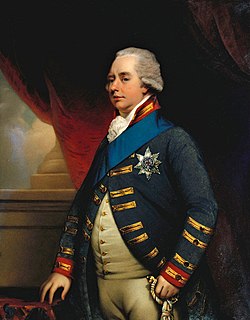
William V was a prince of Orange and the last stadtholder of the Dutch Republic. He went into exile to London in 1795. He was furthermore ruler of the Principality of Orange-Nassau until his death in 1806. In that capacity he was succeeded by his son William.

The Patriottentijd was a period of political instability in the Dutch Republic between approximately 1780 and 1787. Its name derives from the Patriots (Patriotten) faction who opposed the rule of the stadtholder, William V, Prince of Orange, and his supporters who were known as Orangists (Orangisten)
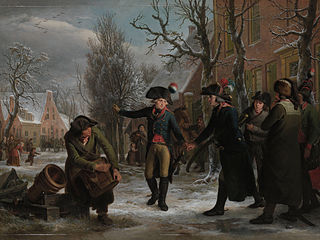
The Batavian Revolution was a time of political, social and cultural turmoil at the end of the 18th century that marked the end of the Dutch Republic and saw the proclamation of the Batavian Republic. The period of Dutch history that followed the revolution is referred to as the "Batavian-French era" (1795–1813) even though the time spanned was only 20 years, of which three were under French occupation under Napoleon Bonaparte.

The Perpetual Edict was a resolution of the States of Holland passed on 5 August 1667 which abolished the office of Stadtholder in the province of Holland. At approximately the same time, a majority of provinces in the States General of the Netherlands agreed to declare the office of stadtholder incompatible with the office of Captain general of the Dutch Republic.
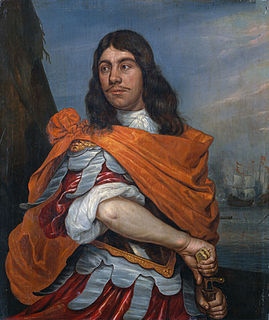
In the history of the Dutch Republic, Orangism or prinsgezindheid was a political force opposing the Staatsgezinde (pro-Republic) party. Orangists supported the Princes of Orange as Stadtholders and military commanders of the Republic, as a check on the power of the regenten. The Orangist party drew its adherents largely from traditionalists – mostly farmers, soldiers, noblemen and orthodox Catholic and Protestant preachers, though its support fluctuated heavily over the course of the Republic's history and there were never clear-cut socioeconomic divisions.
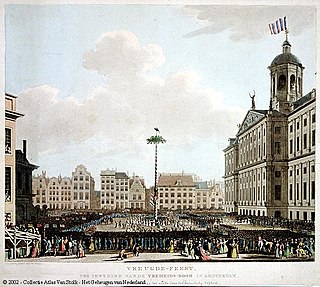
The Batavian Revolution in Amsterdam refers to the transfer of power in the city of Amsterdam on 18 January 1795 to a Revolutionary Committee of the new Batavian Republic. The same day the stadtholder of the Dutch Republic, William V, Prince of Orange fled the country. Amsterdam was the first city that declared itself in the Batavian Revolution that brought about the Batavian Republic.
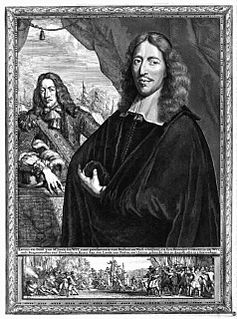
The Loevestein faction or the Loevesteiners were a Dutch States Party in the second half of the 17th century in the County of Holland, the dominant province of the Dutch Republic. It claimed to be the party of "true freedom" against the stadtholderate of the House of Orange-Nassau, and sought to establish a purely republican form of government in the Northern Netherlands.

The Prussian invasion of Holland was a Prussian military campaign in September–October 1787 to restore the Orange stadtholderate in the Dutch Republic against the rise of the democratic Patriot movement.

The Act of Guarantee of the hereditary stadtholderate was a document from 1788, in which the seven provinces of the States General and the representative of Drenthe declared, amongst other things, that the admiralty and captain-generalship were hereditary, and together with the hereditary stadtholderate would henceforth be an integrated part of the constitution of the Dutch Republic. Moreover, members of the House of Orange-Nassau would have the exclusive privilege to hold the office. The Act was in force until the Batavian Republic was established in 1795.

Het Bijltjesoproer or Kattenburgoproer of 30 May 1787 was an uprising of Dutch Orangist ship carpenters in the Kattenburg quarter of Amsterdam against the city's Patriot regenten. These labourers were nicknamed "Bijltjes" ; hence the name Bijltjesoproer.
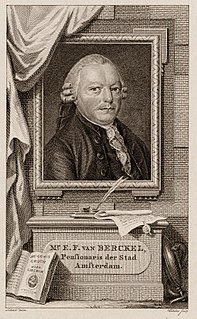
Engelbert François van Berckel was a Dutch politician during the Patriottentijd.

Adriaan van Zeebergh was a Dutch politician during the Patriottentijd.

Hendrik Daniëlszoon Hooft, Ambachtsheer of Urk and Emmeloord was a Dutch politician during the Patriottentijd.

Pieter 't Hoen was a Dutch journalist, poet, and politician who played an important role during the Patriottentijd as the editor of De Post van den Neder-Rhijn.
Hendrik August baron van Kinckel, born as Heinrich August Künckelin , though of German extraction, was a Dutch naval officer and reformer, diplomat, and British confidential agent.

Joachim Rendorp, Vrijheer of Marquette was a Dutch politician of the Patriottentijd in the Dutch Republic.

Willem Gerrit Dedel SalomonszoonAmbachtsheer of Sloten and Sloterdijk was a Dutch politician during the Patriottentijd in the Dutch Republic.

Jean Antoine d'Averhoult, baptized as Jan Anthony d'Averhoult was a Dutch military officer and politician of French Huguenot extraction, who played a leading role in both the Patriottentijd and the French Revolution.

The Siege of Nijmegen occurred from 27 October to 8 November 1794 during the Flanders campaign of the War of the First Coalition. It was the last major military confrontation between the forces of the Revolutionary French First Republic and the reactionary First Coalition of European monarchs including William V, Prince of Orange, before the fall of the Dutch Republic in January 1795, which William had ruled as hereditary stadtholder since 1751. As commander-in-chief of the Dutch States Army, his indecision, several changes of mind and lack of coordination with his Anglo-Hanoverian, Hessian, Prussian and Austrian allies contributed to the eventual surrender of Nijmegen to the French revolutionaries.





















